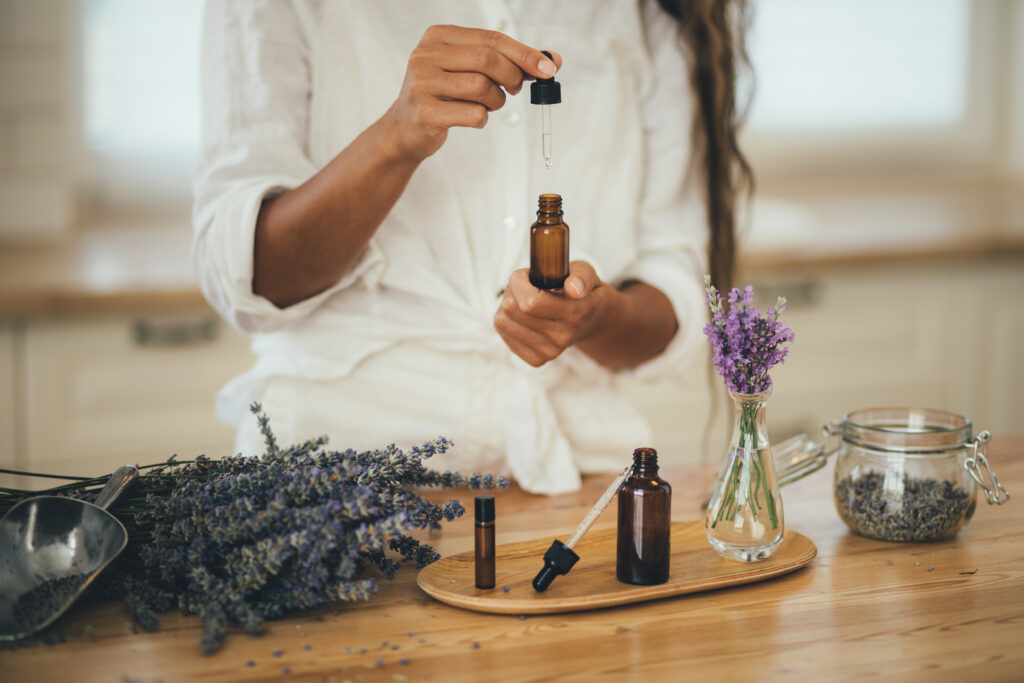Aromatherapy
Aromatherapy is a method that uses natural essential oils to improve health and enhance well-being. Essential oils can be derived from various plants, such as lavender, peppermint, tea tree, lemon, rosemary, and many others.

When can aromatherapy help?
Benefits of aromatherapy:
Supports the following conditions:
- Asthma
- Insomnia
- Fatigue
- Depression
- Inflammation
- Peripheral neuropathy
- Alopecia
- Cancer
- Erectile dysfunction
- Arthritis
How does aromatherapy work?
When inhaling the aroma, the scent molecules interact with the nasal mucosa, which sends signals through neurons to the olfactory gland. This gland processes the signal and transmits the scent information to the limbic system – the center of emotions and memory. Interestingly, our other senses do not pass through these same systems. This might explain why scent memory is so powerful. Depending on the information our brain receives from our nose, the scent can activate the immune system, change blood pressure, affect digestion, trigger memories, evoke emotions, and initiate various physiological reactions.
The following video provides a good overview of how aromatherapy works.
There are three methods of using essential oils:
- Inhalation: This includes all methods that help experience the aroma of the oil. Essential oils can be used aromatically by:
- Diffusing in an aroma lamp
- Dropping onto hands and inhaling
- Using as a perfume
- Topical application: Applying essential oils allows them to absorb into the skin. Some options include:
- Massage
- Applying and rubbing into target areas
- Adding to lotions or moisturizers
- Ingestion: Allows the oil to be transported throughout the body. Ensure the essential oil is safe for internal use before trying:
- Adding to a glass of water
- Taking with a capsule
- Dropping under the tongue
Contraindications of aromatherapy
Most essential oils are safe to use. However, some precautions and side effects should be considered, especially when using prescription medications.
Essential oils should not be applied directly to the skin; a carrier oil is used for dilution. Citrus essential oils can make the skin more sensitive to sunlight, so avoid sun exposure when using these oils.
Children, pregnant, and breastfeeding women should use essential oils with caution and under medical supervision.
Possible side effects of essential oils:
- Rashes
- Possible asthma attacks
- Headaches
- Allergic reactions
- Skin irritation
- Nausea
Useful information
People have used aromatherapy for thousands of years. Ancient cultures in China, India, Egypt, and elsewhere incorporated aromatic plant components into resins, balms, and oils. These natural substances were used for medical and religious purposes due to their physical and psychological benefits.
The distillation of essential oils began with the Persians in the 10th century, although the practice may have been in use long before. Information on essential oil distillation was published in Germany in the 16th century. French doctors recognized the potential of essential oils in treating diseases in the 19th century.
The term “aromatherapy” was coined by the French perfumer and chemist René-Maurice Gattefossé in his book published in 1937. He had previously discovered the healing potential of lavender in treating burns. The book discusses the use of essential oils in treating medical conditions.
Interesting scientific facts
Research has confirmed that aromatherapy reduces anxiety and stress, improves sleep quality, and stabilizes blood pressure in patients with heart stents. Among recently introduced alternative treatments, aromatherapy is easy to apply and quick to act.
It has also been found to significantly reduce pain, suggesting that aromatherapy should be considered a safe supplement to current pain management procedures, as no harmful effects were reported in any of the studies involved. Additionally, the costs associated with aromatherapy are much lower than those of conventional pain treatments. However, more research is needed to fully understand the clinical applications of aromatherapy.
Sources
- Healthline
- Airup
- Effects of Aromatherapy on the Anxiety, National Library of Medicine
- The Effectiveness of Aromatherapy in Reducing Pain, National Library of Medicine
- The Effects of Aromatherapy on Anxiety and Depression in People With Cancer, Frontiers
- Effects of Aromatherapy on the Physical and Mental Health and Pressure of the Middle-Aged and Elderly in the Community, MDPI
